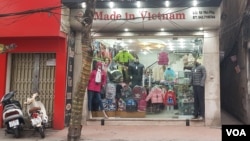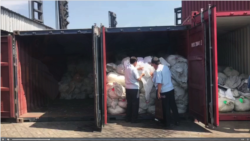China and the United States have come to an agreement this month that seemingly begins to bring an end to their two-year trade war. This is good news for many people worldwide. After all, the International Monetary Fund estimates the trade war decreased world economic growth in 2019 to 3 percent, instead of the estimated 3.8 percent.
But in Southeast Asia, the question that comes to mind is: What does the end of the U.S.-China trade war mean for Vietnam?
The U.S. tariffs on Chinese exports caused many companies to move from China to Vietnam to avoid paying the taxes. As a result, Vietnamese exports to the U.S. increased 28 percent in the first three quarters of 2019.
Also, U.S. President Donald Trump’s heated dispute with China meant he was not looking closely at Vietnam’s trade policies.
“Vietnam hopes China will (extend) U.S. talks,” said Fred Burke. He is a managing partner of Baker & McKenzie Vietnam, an international company.
In other words, if U.S. officials are busy negotiating with the Chinese, they have less time to deal with what is happening in Vietnam.
Trump’s big complaint about Vietnam is that it has a large trade surplus with the U.S. That may be the result of Americans choosing to buy Vietnamese exports over the exports of other countries. However, Trump’s usual answer to a trade imbalance is tariffs.
Vietnam has reason to pay attention. In the past, the U.S. has put tariffs on Vietnamese seafood and metal exports.
For a while, it looked like the U.S. might accuse Vietnamese officials of plotting unfairly to keep their currency low to the dollar. The move would permit Vietnam to make products less costly and so increase exports. It would also give the U.S. a reason to put tariffs on the Southeast Asian nation.
But last week the U.S. Treasury Department said in a report it would simply keep Vietnam on a list of possible currency manipulators.
The U.S. could also put tariffs on Vietnam for trade fraud. Transhipment, a kind of trade fraud, permits Chinese companies to ship their exports through another country, perhaps Vietnam, and sell them on the world market as Vietnamese goods to avoid tariffs.
ING, a banking and financial services company, said it was interesting that the Treasury Department did not criticize Vietnam for transhipment in its report.
Chris Turner and Francesco Pesole are financial experts at ING. They called the Treasury Department’s report “accommodative.” They added that the U.S. government seemed “satisfied” by Vietnamese efforts to prevent trade fraud.
The two experts are among many who believe that if the U.S. is really trying to end its trade war with China, American officials will turn their attention to Europe next. They said that Vietnam is safe for now. But, of course, no one knows if Trump is really ready to settle his dispute with China.
I’m Susan Shand.
The Voice of America reported this story. Susan Shand adapted it for VOA Learning English. Kelly Jean Kelly was the editor.
Write to us in the Comments Section or on our Facebook page.
________________________________________________________________
Words in This Story
tariffs – n. a tax on goods coming into or leaving a country
complaint – n. a statement that says there is a problem or unhappiness about something
currency – n. the paper money that a country uses
manipulator – n. one who manages things for his own betterment or advantage
fraud – n. the crime of using dishonest methods to take something valuable from another person
accommodative – adj. to adapt or adjust to something






